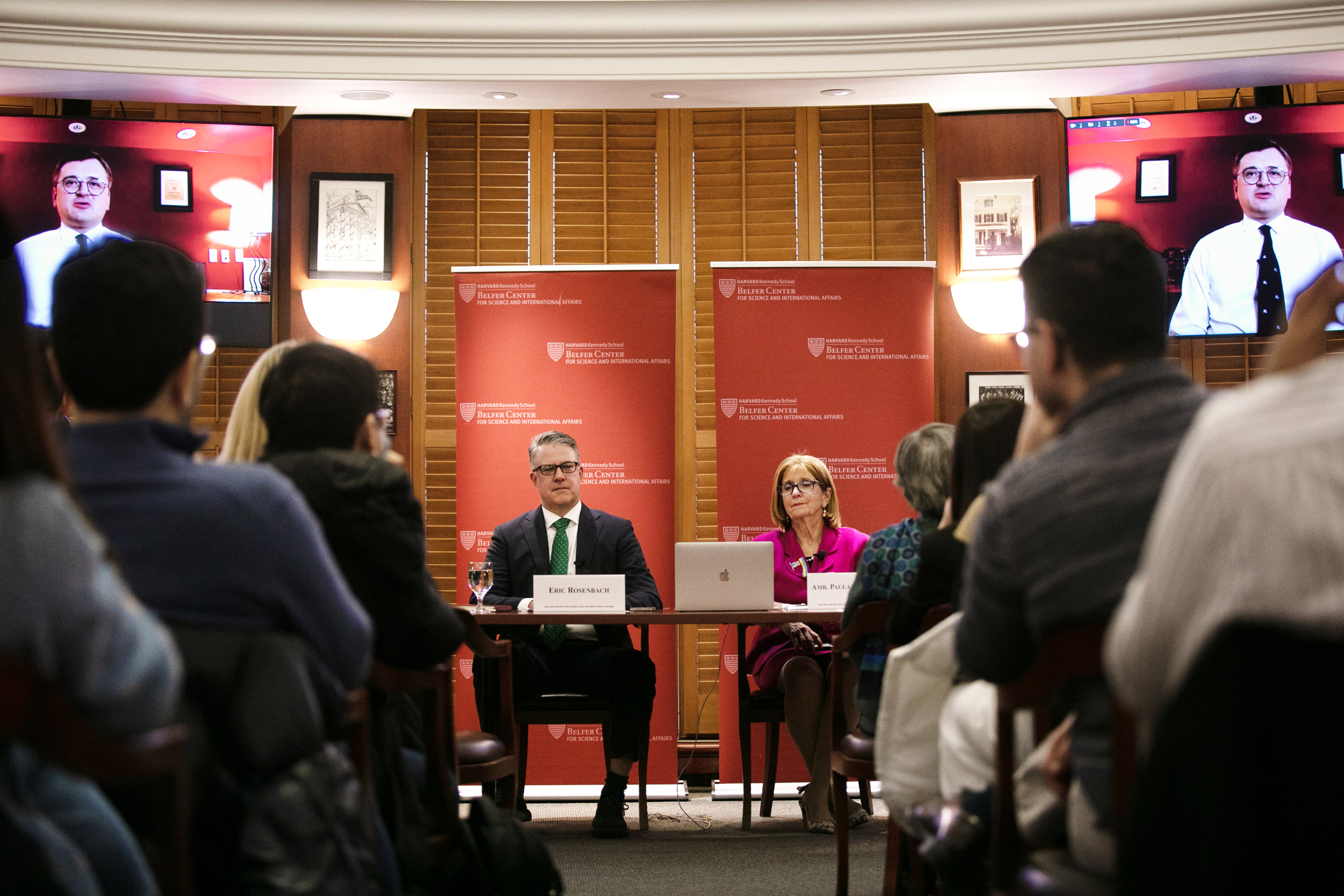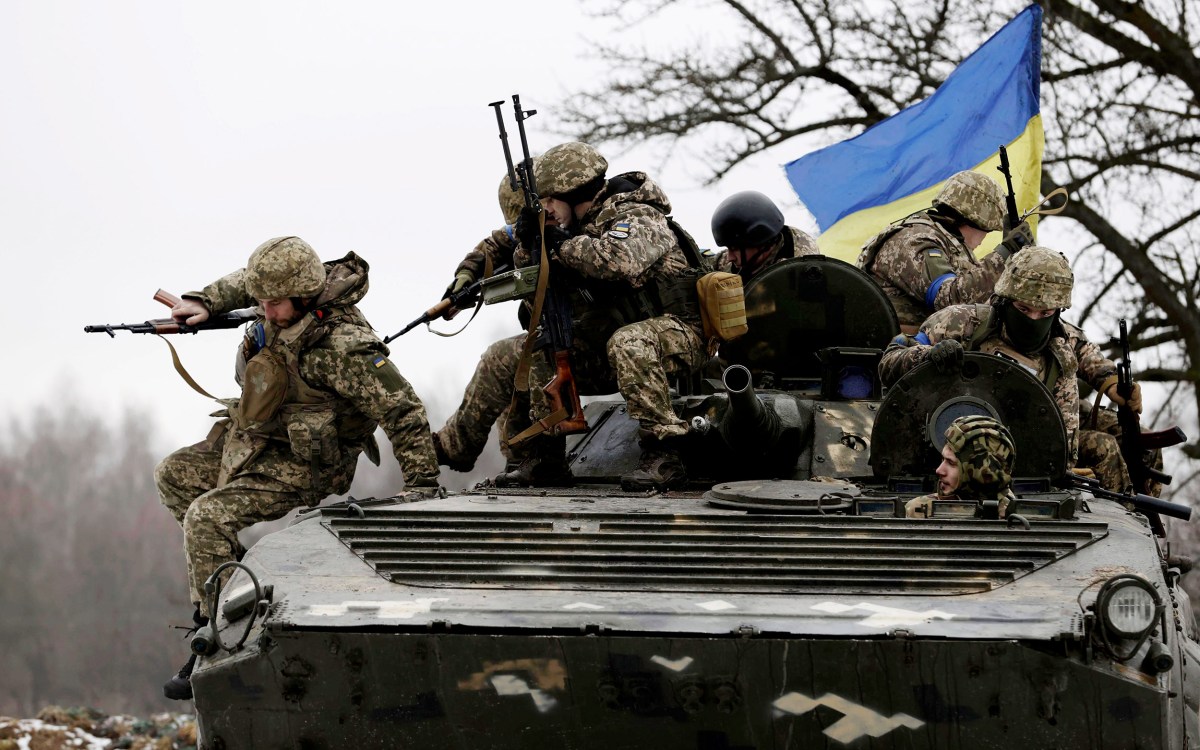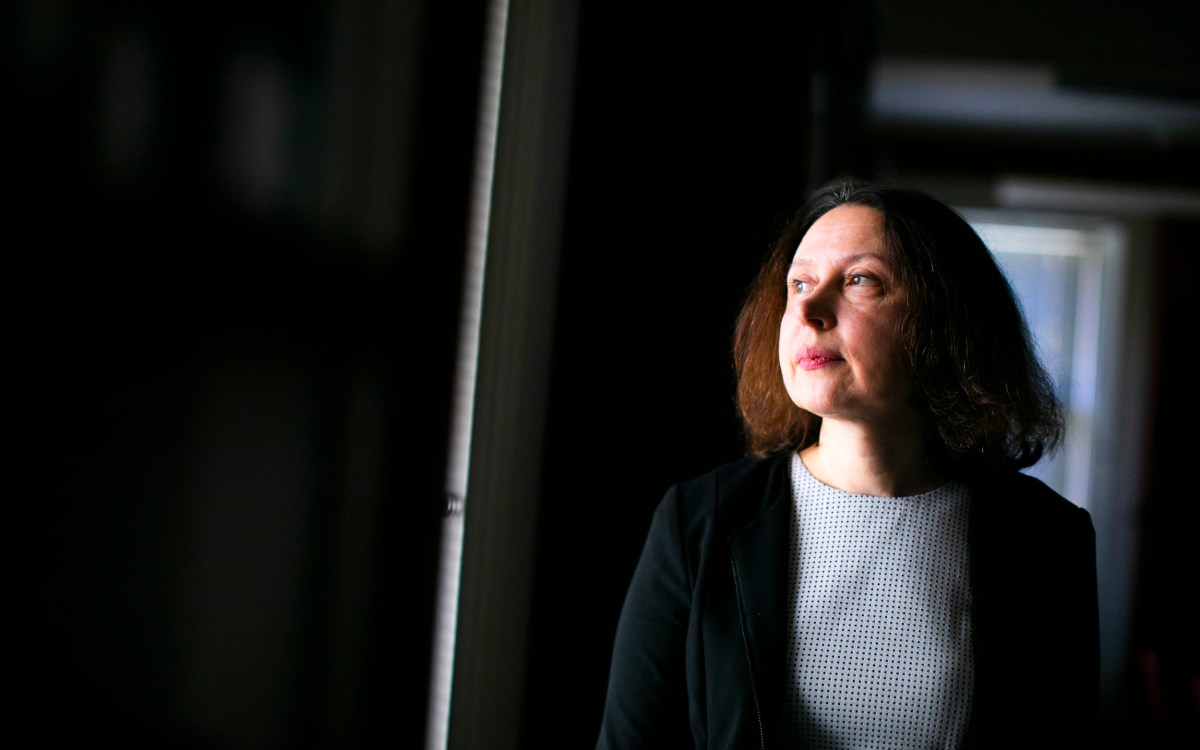
“Ukraine’s victory is in everyone’s interest. We cannot allow Russia to get away with what it has done and get even more emboldened,” said Ukraine’s Foreign Minister Dmytro Kuleba (on screen). Kuleba spoke with Belfer Center’s Eric Rosenbach (left) and Ambassador Paula Dobriansky.
Stephanie Mitchell/Harvard Staff Photographer
Ukraine sees victory ahead, shift to West
Foreign minister offers frank, wide-ranging assessment of Russia war in Kennedy School talk
Ukraine Foreign Minister Dmytro Kuleba gave a frank and wide-ranging talk Wednesday afternoon with Harvard Kennedy School faculty about his country’s push for further support from Western powers, mistakes that set the stage for the Russian invasion, and prospects for a Ukrainian victory.
Kuleba spoke from New York City, where he had just addressed an emergency session of the U.N. General Assembly and met with member states hoping to cement support for a vote on a resolution calling for Russia’s unconditional withdrawal from Ukraine, which the body overwhelmingly adopted on Thursday. He said first-ever talks this week with Jens Stoltenberg, NATO secretary general, and Josep Borrell, the E.U. high representative for foreign affairs and security policy, to discuss his country’s future membership in both “went extremely well.”
The EU has been more open about the candidacy process and timeline than NATO, but Kuleba was confident that Ukraine would be admitted into the defense alliance.
“It’s going to happen,” he said. “It’s just a matter of time. And the sooner it happens, the better it will be for all of us.”
Kuleba backtracked on remarks he made in December that Russia must face an international war crimes tribunal before Ukraine would agree to start any peace talks.
“My present position” is that a tribunal is “not a prerequisite for the beginning of any diplomatic effort,” he said in response to a question about his current stance.
“We welcome all peace initiatives,” he said. “But in most of the cases, it’s just a smokescreen for domestic policy purposes and an excuse not to do something to support Ukraine. That’s how it was in the last 12 months.”
With China signaling that it may provide not just economic but military support for Russia, Kuleba met with State Councilor Wang Yi on the sidelines of the Munich Security Conference last week to discuss a proposed Chinese peace plan.
“If China decides to support Russia militarily, it will be a major blow against its own cornerstone principle of territorial integrity,” said Kuleba. “China is a big and important player; we have to be careful. But, we made our choice. We will fight until we prevail, whatever happens and whoever tries to support Russia in this struggle.”
Western fears that providing weapons to Ukraine might provoke Russia into further escalating violence have been unfounded, he said.
Concerns ran high that Putin would announce such plans in a speech earlier this week. Instead, he said Russia would halt participation in the last remaining arms control treaty it has with the U.S.
“In the end, we all saw that his corridor for escalation is getting narrower,” Kuleba said. “Russia never needed anyone else’s decision or move to escalate in response. Russia was always escalating itself, and then accusing others of provoking it. That’s the classic tactic.”
Eric Rosenbach, co-director of the Belfer Center at HKS and former chief of staff to U.S. Secretary of Defense Ash Carter from 2015 to 2017, asked whether Ukraine President Volodymyr Zelensky requested any specific types of weapons when he met with President Biden in Kyiv this week. Rosenbach offered examples such as MiG 29 fighter jets, long-range missiles, or more air defense systems, equipment that could help offset the weapons imbalance between the combatants and drive Russia to the negotiating table.
Kuleba said Zelensky made such a request but Biden declined. However, Ukraine had already gotten six of the seven types of weapons it believes are critical to win the war (“they were game-changers”). All that remains undelivered are fighter jets.
“And I have no doubt that this option will be unlocked,” he said.
Victory for Ukraine would be a complete Russian withdrawal and restoration of the nation’s internationally recognized borders as of 1991, he said. But that wouldn’t be enough to guarantee future global security.
“We can win the war. We can expel Russia from our territory — and we will do so — but if Russia remains as it is, it will continue to be a threat,” Kuleba said. “Ukraine’s victory is in everyone’s interest. We cannot allow Russia to get away with what it has done and get even more emboldened” and “embolden the world’s other evil forces.”
Echoing comments made by analyst Fiona Hill last week at HKS, Kuleba said a series of “strategic mistakes” in the early 1990s by the U.S., the West, and Ukraine just before the 1991 collapse of the Soviet Union and Ukraine’s declaration of independence set the stage for the current war.
The first error was an August 1991 speech delivered by President George H.W. Bush to the Ukrainian parliament in which the American leader urged the then-Soviet republic to avoid “suicidal nationalism” and stick with the Soviet Union under President Mikhail Gorbachev, he said. Three weeks later, tanks rolled into Moscow in an attempted coup d’état. By December, Gorbachev resigned, and the Soviet Union had fallen.
Allowing a newly reconstituted Russia under Boris Yeltsin to simply slide into the Soviet Union’s seat on the U.N. Security Council without any formal adjudication or undergoing any legal procedure, as required by the U.N. Charter, was wrong and ill-advised and their continued presence is “illegitimate. Russia has no right to be there,” he said.
Ukraine’s 1994 agreement to denuclearize in exchange for promises from the U.N. Security Council, the U.S., the U.K., and Russia, that Ukraine would be protected was also a mistake, as was the fateful decision in 2008 at the NATO summit in Bucharest, Romania, to put off formalizing Ukraine and Georgia’s path to eventual membership.
“While the West exercised short-sighted cautiousness, Russia was growingly persistent and self-assured,” he said, recounting Putin’s many acts of aggression over the last three decades in former Soviet states.
But Ukraine has also made mistakes, Kuleba said, like allowing oligarchs and corruption to flourish, overlooking the readiness of Ukraine’s armed forces, and allowing Russia to periodically get involved in domestic politics.
“But whatever flaws we have, one thing has always made us fundamentally different from Russia. The core of the Ukrainian project has always been freedom; whereas the core of the Russian project has always been obedience — obedience of Russian nationals towards [a] tsar and the imposed obedience of [its] neighbors towards Russia,” said Kuleba. “Freedom is what makes Ukraine part of the West.”






